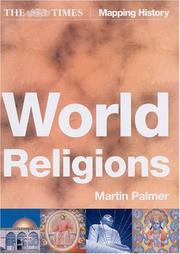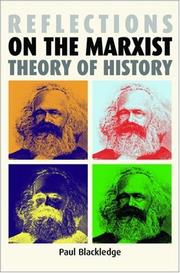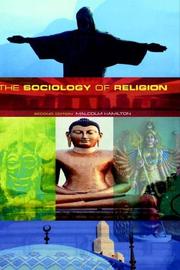| Listing 1 - 10 of 127 | << page >> |
Sort by
|

ISBN: 0007199910 Year: 2004 Publisher: London Times Books / Harper Collins Publishers
Abstract | Keywords | Export | Availability | Bookmark
 Loading...
Loading...Choose an application
- Reference Manager
- EndNote
- RefWorks (Direct export to RefWorks)
world religions --- human faith --- religion in the modern world --- cults

ISBN: 0415217830 0415217849 9780415217842 Year: 2002 Publisher: London Routledge
Abstract | Keywords | Export | Availability | Bookmark
 Loading...
Loading...Choose an application
- Reference Manager
- EndNote
- RefWorks (Direct export to RefWorks)
Religions. --- Religions --- world religions --- religion in the modern world --- religion and spirituality --- colonialism --- religious nationalism --- globalization --- secularization --- religion and authority --- Japanese religions --- Japan
Book
ISBN: 9789004375888 9789004342545 9004342540 Year: 2018 Publisher: Leiden Brill
Abstract | Keywords | Export | Availability | Bookmark
 Loading...
Loading...Choose an application
- Reference Manager
- EndNote
- RefWorks (Direct export to RefWorks)
This volume sets out to explore the world of domestic devotions and is premised on the assumption that the home was a central space of religious practice and experience throughout the early modern world. The contributions to this book, which deal with themes dating from the fifteenth to the eighteenth century, tell of the intimate relationship between humans and the sacred within the walls of the home. The volume demonstrates that the home cannot be studied in isolation: the seventeen essays, that encompass religious history, the histories of art and architecture, material culture, literary history, and social and cultural history, instead point individually and collectively to the porosity of the home and its connectedness with other institutions and broader communities.
Religion & beliefs --- Religion: general --- History of religion --- Families --- religious life --- spiritual life --- home --- religious aspects --- early modern world --- Spiritual life. --- Home --- Religious life. --- Religious aspects. --- Life, Spiritual --- Religious life --- Spirituality --- Family worship

ISBN: 1847791344 9781847791344 0719069564 0719069572 9780719069567 9780719069574 Year: 2006 Publisher: Manchester Manchester University Press
Abstract | Keywords | Export | Availability | Bookmark
 Loading...
Loading...Choose an application
- Reference Manager
- EndNote
- RefWorks (Direct export to RefWorks)
A decade after Francis Fukuyama announced the 'End of History', anti-capitalist demonstrators at Seattle and elsewhere have helped reinvigorate the Left with the reply 'another world is possible'. More than anyone else it was Marx who showed that slogans such as this were no utopian fantasies, and that capitalism was just as much a historical mode of production, no more natural and certainly no less contradictory, than were the feudal and slave modes which proceeded it. Paul Blackledge opens this study with a defence of the Marxist approach to the study of history against what he argues as bei
Historical materialism. --- Dialectical materialism --- History --- Marxian historiography --- Philosophy --- Engels' theory of history. --- Marxism. --- Marxist historiography. --- Marxist theory of history. --- Stalinism. --- anti-capitalist movement. --- anti-war movement. --- capitalism. --- mode of production. --- post-modern world. --- post-modernist approaches. --- relations of production.
Book
ISBN: 1315728672 1317543637 1844657574 9781317543633 9781317543626 1317543629 9781317543619 1317543610 9781317543633 9781315728674 9781908049230 Year: 2013 Publisher: Sheffield : Equinox,
Abstract | Keywords | Export | Availability | Bookmark
 Loading...
Loading...Choose an application
- Reference Manager
- EndNote
- RefWorks (Direct export to RefWorks)
Religion and spirituality are being transformed in our late modern and secularising times. New forms of belief proliferate, often notable for not being limited to traditional systems of reference or expression. Increasingly, these new religions present worldviews which draw directly upon popular culture - or occulture - in fiction, film, art and the internet. Fantasy and Belief explores the context and implications of these types of beliefs through the example of the Otherkin community. The Otherkin are a loosely-affiliated group who believe themselves to be in some way more than just human, their non-humanity often rooted in the characters and narratives of popular fantasy and science fiction. Challenging much current sociological thinking about spirituality and consumption, Fantasy and Belief reveals how popular occulture operates to recycle, develop, and disseminate metaphysical ideas, and how the popular and the sacred are combining in new ways in today's world.
Religion and culture. --- Mass media --- Culture and religion --- Culture --- Religious aspects. --- Moral and religious aspects --- religion --- occulture and the modern world --- the Otherkin --- fantasy --- re-enchantment --- the internet and popular cultures --- alternative religion --- popular narratives --- digital culture --- occultism
Book
ISBN: 9780520965157 0520965159 9780520291331 9780520291348 Year: 2018 Publisher: Oakland, California
Abstract | Keywords | Export | Availability | Bookmark
 Loading...
Loading...Choose an application
- Reference Manager
- EndNote
- RefWorks (Direct export to RefWorks)
Since its publication in 1962, Rachel Carson's book Silent Spring has often been celebrated as the catalyst that sparked an American environmental movement. Yet environmental consciousness and environmental protest in some regions of the United States date back to the nineteenth century, with the advent of industrial manufacturing and the consequent growth of cities. As these changes transformed people's lives, ordinary Americans came to recognize the connections between economic exploitation, social inequality, and environmental problems. As the modern age dawned, they turned to labor unions, sportsmen's clubs, racial and ethnic organizations, and community groups to respond to such threats accordingly. The Myth of Silent Spring tells this story. By challenging the canonical "songbirds and suburbs" interpretation associated with Carson and her work, the book gives readers a more accurate sense of the past and better prepares them for thinking and acting in the present.
Environmentalism --- History. --- 1960s. --- 19th century. --- academic. --- american history. --- american literature. --- community. --- economy. --- environment. --- environmental history. --- environmental problems. --- environmentalism. --- environmentalist. --- exploitation. --- industrial revolution. --- industry. --- inequality. --- labor union. --- modern world. --- oppression. --- protest. --- protestor. --- scholarly. --- social studies. --- united states. --- us history.
Book
ISBN: 1526140616 1526140608 Year: 2020 Publisher: [s.l.] : Manchester University Press,
Abstract | Keywords | Export | Availability | Bookmark
 Loading...
Loading...Choose an application
- Reference Manager
- EndNote
- RefWorks (Direct export to RefWorks)
By expanding the geographical scope of the history of violence and war, this volume challenges both Western and state-centric narratives of the decline of violence and its relationship to modernity. It highlights instead similarities across early modernity in terms of representations, legitimations, applications of, and motivations for violence. It seeks to integrate methodologies of the study of violence into the history of war, thereby extending the historical significance of both fields of research. Thirteen case studies outline the myriad ways in which large-scale violence was understood and used by states and non-state actors throughout the early modern period across Africa, Asia, the Americas, the Atlantic, and Europe, demonstrating that it was far more complex than would be suggested by simple narratives of conquest and resistance. Moreover, key features of imperial violence apply equally to large-scale violence within societies. As the authors argue, violence was a continuum, ranging from small-scale, local actions to full-blown war. The latter was privileged legally and increasingly associated with states during early modernity, but its legitimacy was frequently contested and many of its violent forms, such as raiding and destruction of buildings and crops, could be found in activities not officially classed as war.
Technology & Engineering / Agriculture --- Technology --- Applied science --- Arts, Useful --- Science, Applied --- Useful arts --- Science --- Industrial arts --- Material culture --- Banditry. --- Early Modern World. --- Ideology. --- Militarisation. --- Piracy. --- Raiding. --- Restraint. --- Slavery. --- Violence. --- War.
Book
ISBN: 1787448959 1843845563 Year: 2020 Publisher: Cambridge : D.S. Brewer,
Abstract | Keywords | Export | Availability | Bookmark
 Loading...
Loading...Choose an application
- Reference Manager
- EndNote
- RefWorks (Direct export to RefWorks)
Essays on the post-modern reception and interpretation of the Middle Ages
Medievalism. --- Medievalism in motion pictures. --- Medievalism in literature. --- Civilization, Medieval --- Middle Ages --- Motion pictures --- Cultural Interpretation. --- Film. --- Historical References. --- Literature. --- Medieval Influences. --- Middle Ages. --- Modern World. --- Politics. --- Post-Modern Reception.
Book
ISBN: 9780812297829 0812297822 Year: 2020 Publisher: Philadelphia
Abstract | Keywords | Export | Availability | Bookmark
 Loading...
Loading...Choose an application
- Reference Manager
- EndNote
- RefWorks (Direct export to RefWorks)
The first comprehensive biography of Elihu Palmer tells the life story of a freethinker who was at the heart of the early United States' protracted contest over religious freedom and free speech.When the United States was new, a lapsed minister named Elihu Palmer shared with his fellow Americans the radical idea that virtue required no religious foundation. A better source for morality, he said, could be found in the natural world: the interconnected web of life that inspired compassion for all living things. Religions that deny these universal connections should be discarded, he insisted. For this, his Christian critics denounced him as a heretic whose ideas endangered the country.Although his publications and speaking tours made him one of the most infamous American freethinkers in his day, Elihu Palmer has been largely forgotten. No cache of his personal papers exists and his book has been long out of print. Yet his story merits telling, Kirsten Fischer argues, and not only for the dramatic account of a man who lost his eyesight before the age of thirty and still became a book author, newspaper editor, and itinerant public speaker. Even more intriguing is his encounter with a cosmology that envisioned the universe as interconnected, alive with sensation, and everywhere infused with a divine life force.Palmer's "heresy" tested the nation's recently proclaimed commitment to freedom of religion and of speech. In this he was not alone. Fischer reveals that Palmer engaged in person and in print with an array of freethinkers—some famous, others now obscure. The flourishing of diverse religious opinion struck some of his contemporaries as foundational to a healthy democracy while others believed that only a strong Christian faith could support democratic self-governance. This first comprehensive biography of Palmer draws on extensive archival research to tell the life story of a freethinker who was at the heart of the new nation's protracted contest over religious freedom and free speech—a debate that continues to resonate today.
Deism --- Freethinkers --- Free thinkers --- Rationalists --- Rationalism --- Palmer, Elihu, --- A Fourth of July Oration. --- American Enlightenment. --- Deistical Society. --- First Amendment. --- Freedom of speech. --- Prospect, or View of the Modern World. --- The Principles of Nature. --- The Temple of Reason. --- Vitalism.

ISBN: 041522666X 9780415226677 9780415226660 0415226678 Year: 2001 Publisher: London: Routledge,
Abstract | Keywords | Export | Availability | Bookmark
 Loading...
Loading...Choose an application
- Reference Manager
- EndNote
- RefWorks (Direct export to RefWorks)
| Listing 1 - 10 of 127 | << page >> |
Sort by
|

 Search
Search Feedback
Feedback About UniCat
About UniCat  Help
Help News
News